Evolution (2021): the wounds of history | las heridas de la historia
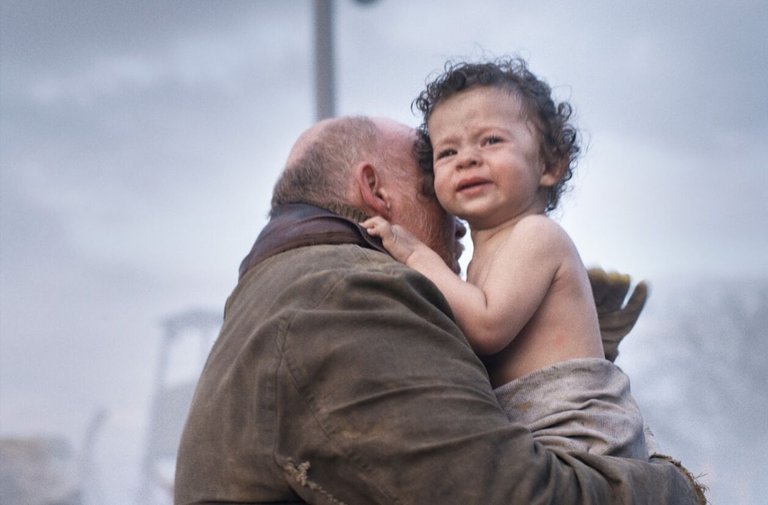
Una historia muy emocional contada a través de tres generaciones
Three years ago, Vanessa Kirby gave us an anthology performance when she starred in Pieces of a Woman, a film with a great emotional charge and an incredible opening sequence: a continuous shot that shows how an experience that should have been wonderful turns into something stressful and overwhelming. But that performance wouldn't have stood out as much if it weren't for the Hungarian couple behind the film: director Kornél Mundruczó and screenwriter Kata Weber.
Hace tres años que Vanessa Kirby nos regaló una actuación de antología al protagonizar Pieces of a Woman, una película con una gran carga emotiva y una secuencia inicial increíble: una toma continua que muestra cómo una experiencia que debía ser maravillosa se convierte en algo estresante y abrumador. Pero esa actuación no habría destacado tanto si no fuese por la pareja húngara detrás de la película: el director Kornél Mundruczó y la guionista Kata Weber.
That's why I decided to watch - from among the options I had at that time - this Hungarian-German drama called Evolution premiering at the Cannes Festival in 2021, directed and written by the same duo. The film is structured in three parts titled respectively Eva, Lena and Jonas, which have a family connection: the protagonist of each part is a relative of the protagonist of the previous parts. Now, the central theme of the story, if I had to choose just one, would be inherited guilt (or shame); or perhaps calling it another way, the burden of blood. In the first part, which lasts just under twenty minutes, we find what seems like a routine cleaning of a basement. Little by little, those of us who have seen similar stories notice details that reveal a context that is not mentioned because at no time do the characters utter a word, but their gestures, their uniforms and the characteristics of the place take us to the end of the War World II and inside a gas chamber in a concentration camp. I don't want to reveal anything more about this part, but as in Pieces of a Woman, the routine transforms into horror as the scene progresses and that suffocating effect is accentuated thanks to a continuous shot and a camera that moves inside the room with the freedom and chaos that one could move oneself. The experience is truly immersive and shock, followed by sadness, tenderness and hope, invade the viewer.
Por eso decidí ver - de entre las opciones que tenía en ese momento - este drama húngaro-alemán llamado Evolution estrenado en el Festival de Cannes en 2021, dirigido y escrito por la misma dupla. El film esá estructurado en tres partes tituladas respectivamente Eva, Lena y Jonas, que tienen una conexión familiar: el protagonista de cada parte es un pariente del protagonista de las partes anteriores. Ahora bien, el tema central de la historia, si es que tuviera que escoger sólo uno, sería la culpa (o la vergüenza) heredada; o tal vez llamándola de otra manera, la carga de la sangre. En la primera parte, que dura poco menos de veinte minutos nos encontramos con lo que parece una limpieza de rutina de un sótano. Poco a poco, quienes hemos visto historias similares, notamos detalles que nos revelan un contexto que no se menciona porque en ningún momento los personajes pronuncian palabra alguna, pero sus gestos, sus uniformes y las características del lugar nos llevan al final de la segunda guerra mundial y al interior de una cámara de gas en un campo de concentración. No quiero revelar nada más de esta parte, pero al igual que en Pieces of a Woman, lo rutinario se transforma en horror a medida que la escena avanza y ese efecto asfixiante se acentúa gracias a una toma continua y a una cámara que se mueve dentro de la habitación con la libertad y el caos que podría moverse uno mismo. La experiencia es realmente inmersiva y la conmoción, seguida de la tristeza, a ternura y la esperanza, invaden al espectador.
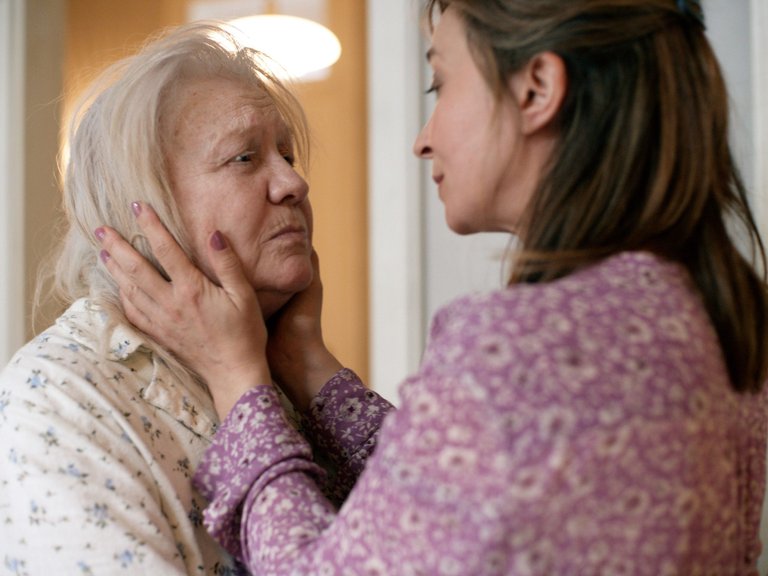
In the second part, set in the current era, Lena visits her mother, Eva, and they have a typically family conversation: full of crying, laughter, complaints, apologies, reconciliation, offenses and a lot of emotion. Eva, at her advanced age, begins to forget things, but there are memories recorded so deep inside her body and her heart that they remain alive for her. And also for Lena.
En la segunda parte, ambientada en la época actual, Lena visita a su madre, Eva, y mantienen una convresación típicamente familiar: llena de llanto, risas, reclamos, disculpas, reconciliación, ofensas y mucha emoción. Eva, a su avanzada edad, comienza a olvidar cosas, pero hay recuerdos grabados tan dentro de su cuerpo y de su corazón que siguen vivos para ella. Y también para Lena.
Because what Lena explains to her mother is that she too has lived her entire life in a concentration camp even though she was born after the war. The fears, the anxiety, the psychological break that growing up with a mother after such a traumatic experience represented for Eva, has been passed on to her daughter. Because her mother was tough, she was able to survive, that's why she wants Lena to be tough too and that's why she raised her the only way she knew how, the way her mother raised her. But the behaviors that could be normal for Eva in her childhood because it was the only thing she had known are not necessarily understood by Lena who lives in a different reality. That's why Lena tells her mother one of the best phrases in the film: "I don't want to be a survivor. I want a life". Added to this is an identity crisis that Lena, an adult woman, is going through, because she requires the help of an institution that supports Jews, but first she needs to prove that she is one, which is why she needs the birth certificate of her grandmother, the mother of Eva, which is not so simple. As she herself says: "We were Jews when we couldn't be. And now that we can be openly we can't either." With the same idea of the false continuous take, the second scene develops with great rhythm, incisive but necessary dialogues that tell us the story of these two women (and the grandmother) and lead us to different emotional explosions.
Porque lo que Lena le explica a su madre es que élla también ha vivido toda su vida en un campo de concentración aunque haya nacido después de la guerra. Los miedos, la ansiedad, el quiebre psicológico que representó para Eva crecer con una madre salida de tan traumática experiencia se los ha pasado a su hija. Como su madre era dura, pudo sobrevivir, por eso quiere que Lena también sea dura y por eso la crió de la única forma que sabía, la forma en que su madre la crió a ella. Pero las conductas que podían ser normales para Eva en su infancia porque era lo único que había conocido no necesariamente son entendidas por Lena que vive en una realidad diferente. Por eso Lena le espeta a su madre una de las mejores frases de la película: "Yo no quiero ser una sobreviviente. Quiero una vida". A ello se suma una crisis de identidad que atraviesa Lena, mujer ya adulta, porque requiere la ayuda de una institución de apoyo a los judíos, pero antes necesita demostrar que lo es, por eso necesita la partida de nacimiento de su abuela, la madre de Eva, lo que no resulta tan sencillo. Como ella misma lo dice: "Fuimos judíos cuando no se podía serlo. Y ahora que podemos serlo abiertamente tampoco podemos". Con la misma idea de la falsa toma continua, la segunda escena se desarrolla con gran ritmo, diálogos incisivos, pero necesarios que nos van contando la historia de estas dos mujeres (y de la abuela) y nos conducen a diferentes explosiones emocionales.
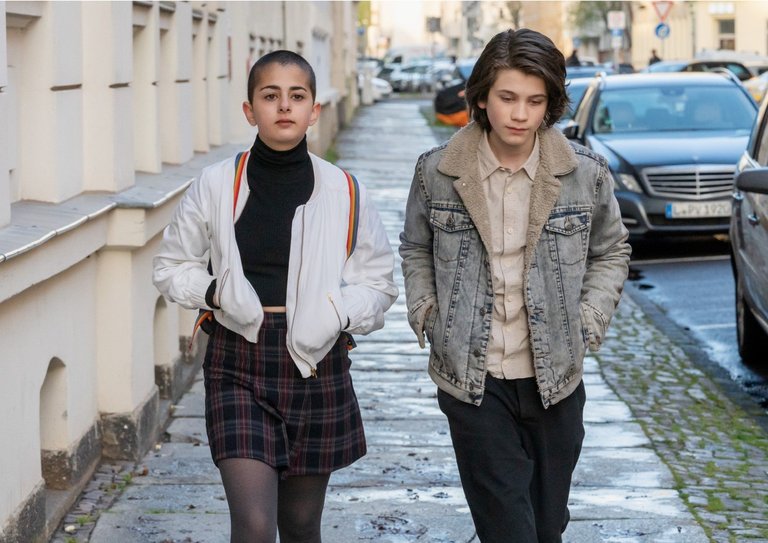
And then we come to the third part, the final half hour of Evolution, where we see Jonas, Lena's son, who is bullied at a school in Berlin for being Jewish, really? at this point in history? The point is that unlike his deceased grandmother, his great-grandmother or his mother, Jonas doesn't feel Jewish. What's more, he doesn't even know what that is or what he is. Is he German? is he hungarian? is he jewish? Is life defined by that? With less eloquence and less emotionality than his mother, Jonas also reflects an identity crisis whose response does not seem to matter much to him because we see him sharing a little more and more with Yasmine, a somewhat rebellious Turkish girl who also doesn't seem to want to live under the strict regulations imposed by the culture of her parents. From that perspective, Jonas' Jewish-Hungarian heritage seems to represent a problem in approaching Yasmine, but neither of them seems to take that difference between them very seriously. It's true that the performances of these young actors are good and reflect a certain sweetness, but leaving that aside, I felt that the third part was a decline compared to the quality of the first hour of the film.
Y entonces llegamos a la tercera parte, la media hora final de Evolution, en donde vemos a Jonas, el hijo de Lena, que sufre bullying en un colegio de Berlín por ser judío, ¿en serio? ¿a estas alturas de la historia? El punto es que a diferencia de su abuela, ya fallecida, su bisabuela o su madre, Jonas no se siente judío. Es más, ni siquiera sabe qué es eso o qué es él ¿es alemán? ¿es húngaro? ¿es judío? ¿acaso la vida se define a partir de eso? Con menos elocuencia y menos emotividad que su madre, Jonas también refleja una crisis de identidad cuya respuesta no parece importarle mucho porque lo vemos compartir cada vez un poco más con Yasmine, una niña turca algo rebelde que tampoco parece querer vivir bajo la estricta normativa impuesta por la cultura de sus padres. Desde esa perspectiva, la herencia judío-húngara de Jonas pareciera representar un problema para acercarse a Yasmine, pero ninguno de los dos parece tomarse muy en serio esa diferencia entre ellos. Es cierto que las actuaciones de estos jóvenes actores son buenas y reflejan cierta dulzura, pero dejando eso de lado, sentí que la tercera parte fue un descenso respecto a la calidad de la primera hora de la película.
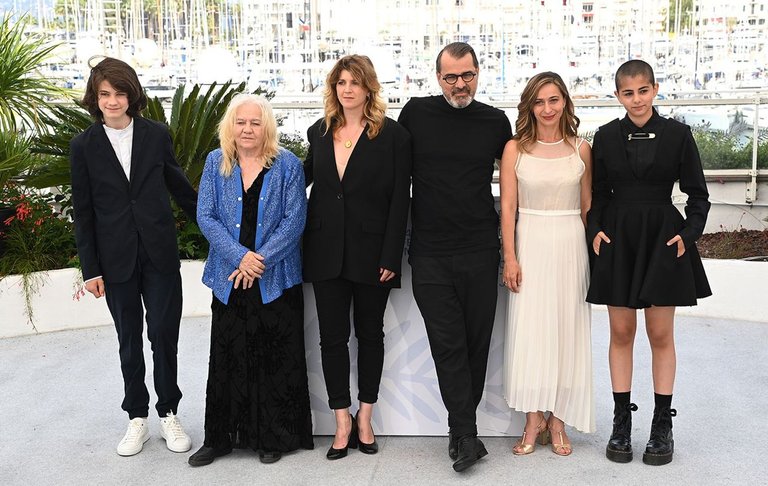
El elenco principal junto a Kornél Mundruczó y Kata Wéber
However, despite that final inconsistency and the fact that - in my opinion - the film required a more dramatic ending (I don't want to say tragic) and not the simplicity of that beautiful but far-fetched idea that love can fix everything, Evolution is a very interesting movie. The performances in general are good, highlighting those of Annamária Láng as Lena and that of Lili Monori as Eva, the script is very well done (at least 2/3 of it) and those continuous, long, uncut shots, give the viewer a more real and immersive experience, which is always appreciated when approaching any artistic expression. As a cinematographic product I would say that Evolution is a little below Pieces of a Woman, because it has some technical flaws, writing details and things like that, but as a story, as a message, I feel that it's important to reflect on the weight of the past, of those wounds of history that don't heal and that extend to affect generations that did not experience those harsh events but who do currently suffer the consequences because they are raised by people forged in that adversity who transmit to their descendants the fear and anguish of what we experienced years and even decades ago, have any of you seen this movie? what did you think? I read you in the comments.
Sin embargo, a pesar de esa inconsistencia final y de que - a mi parecer - la película requería un final más dramático (no quiero decir trágico) y no la simpleza de esa hermosa aunque inverosímil idea de que el amor puede arreglarlo todo, Evolution es una película muy interesante. Las actuaciones en general son buenas, destacando las de Annamária Láng como Lena y la de Lili Monori como Eva, el guión está muy bien hecho (al menos 2/3 de él) y esas tomas continuas, largas, sin cortes, brindan al espectador una experiencia más real e inmersiva, lo que siempre es de agradecer a la hora de acercarse a cualquier expresión artística. Como producto cinematográfico diría que Evolution está un poco por debajo de Pieces of a Woman, porque tiene algunas falencias técnicas, detalles de escritura y cosas así, pero como historia, como mensaje, siento que es importante reflexionar sobre el peso del pasado, de esas heridas de la historia que no cicatrizan y que se extienden hasta afectar generaciones que no vivieron esos duros acontecimientos pero que sí sufren en la actualidad las consecuencias porque son criadas por personas forjadas en esa adversidad que transmiten a sus descendientes el miedo y la angustia de lo vivido años e incluso décadas atrás, ¿alguno de ustedes ha visto esta película? ¿qué les pareció? Los leo en los comentarios.
Reviewed by | Reseñado por @cristiancaicedo
Other posts that may interest you | Otros posts que pueden interesarte:
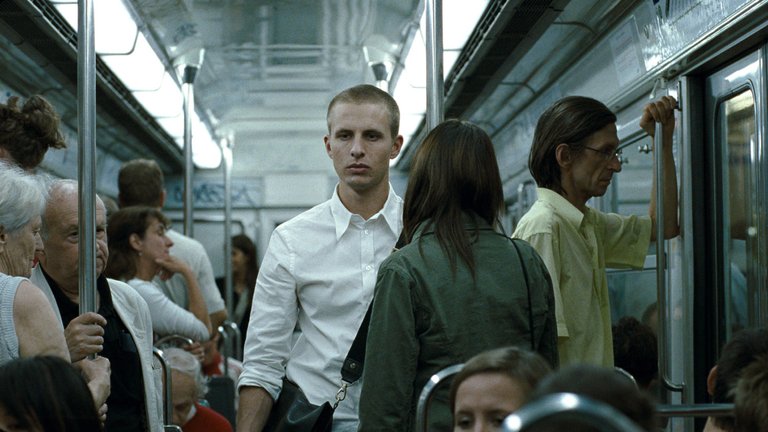  |
|---|
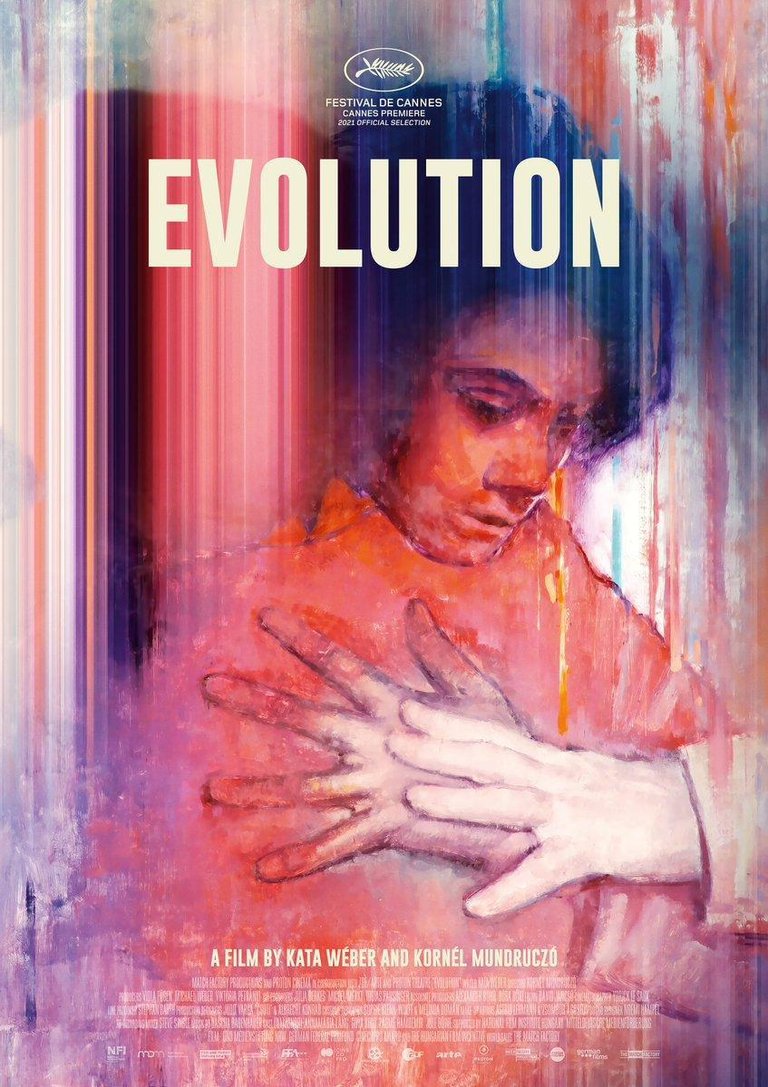
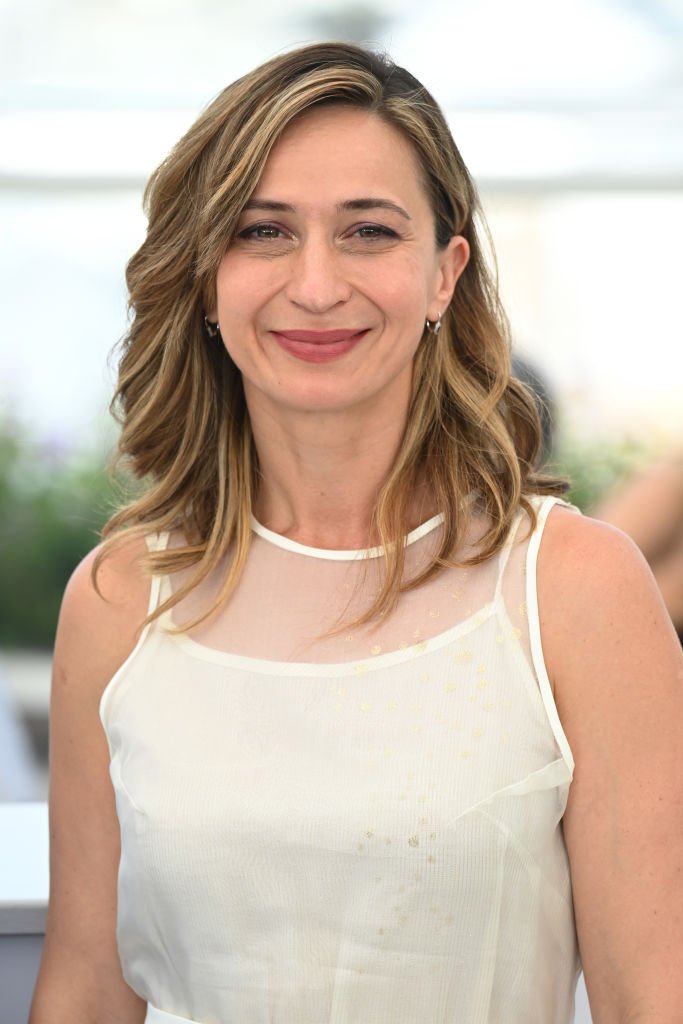

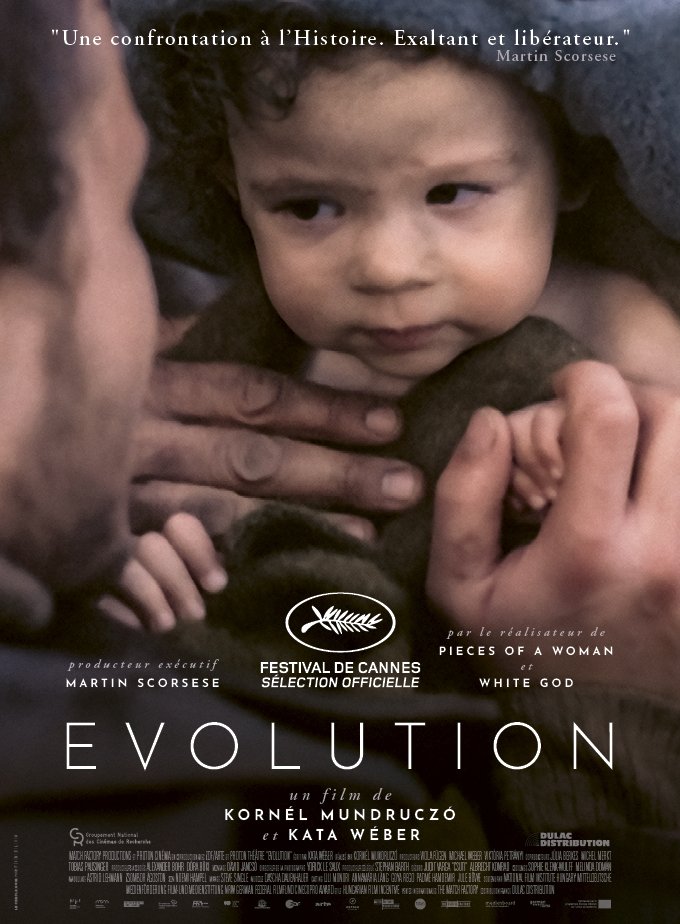
Congratulations @cristiancaicedo! You have completed the following achievement on the Hive blockchain And have been rewarded with New badge(s)
Your next target is to reach 4000 comments.
You can view your badges on your board and compare yourself to others in the Ranking
If you no longer want to receive notifications, reply to this comment with the word
STOPTo support your work, I also upvoted your post!
Check out our last posts:
Although tragedy is not my favorite type of film, stories like this definitely make your heart soften and perhaps even make you cry.